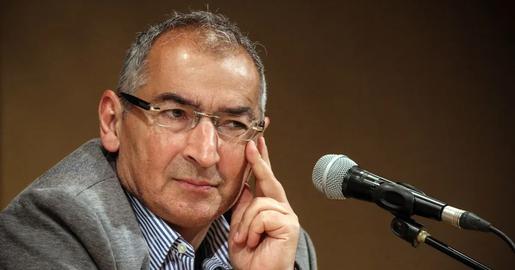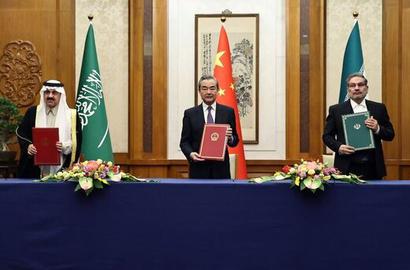Last week’s agreement between Iran and Saudi Arabia to resume diplomatic relations after years of tensions was welcomed by many supporters of the Islamic Republic, the same individuals who expressed satisfaction when diplomatic relations were severed with Riyadh.
News of the rapprochement between the two regional foes has raised questions about the Islamic Republic foreign policy, its interaction with the world and the “Woman, Life, Freedom” protest movement.
IranWire has asked Sadegh Zibakalam, a political activist and former professor of political science at Tehran University, about the significance of this agreement and its expected impact on the war in Yemen, on the lives of the Iranian people and on the ongoing protests in the country.
***
What do you think about the deal, in general?
In general, I view this agreement positively. Throughout the seven years during which Iran has supported the Houthis, I was asking: if the group supported by Iran wins against the Saudi Arabia-baked group, what would happen if the Houthis took control of entire Yemen, from north to south? What benefits would this bring to the interests of the Islamic Republic? After considering this question, I concluded that the victory of the Houthis would have no other results or achievements but calamity and misfortune for the Islamic Republic of Iran.
We must help build a country of 20 million people that has emerged from years of war, destruction and tragedy. In our own country, we have serious problems to reconstruct the cities of Khorramshahr and Sarpul-e-Zahab and other parts of the country that have been damaged because of the war [against Iraq], even after three decades have passed. Adding a poor, suffering country of 20 million people to our problems would be an immense burden. Furthermore, Hezbollah and Lebanese Shias are already a heavy burden on the shoulders of the Islamic Republic. Thus, supporting the Houthis would have no other benefit except political competition with Riyadh.
Do you think Iran will stop supporting the Houthis after this deal, whose details have not yet been announced?
If Iran intends to continue its previous policies of supporting the Houthis in Yemen, which includes secretly providing them with weapons and encouraging them to fight against pro-Saudi tribes and nomads, then China would come into play. The Iranian government has high hopes for Chinese investment, which they believe will lead to an economic boom in Iran. Therefore, if certain factions within Iran wish to persist in supporting the Houthis, this is no longer feasible, given that China is now involved. I am confident that this agreement is significant and marks the end of Iran's military support for the Houthis and the Yemeni civil war.
The Islamic Republic has a track record of unreliability, which has led some to question whether China, Saudi Arabia or the Western countries that are satisfied with this agreement can trust Iran in upholding its provisions…
In the past, it was a common practice in the market for a reputable person to sign the back of a cheque when it was given to you. The back of this deal was signed by the Chinese, and Iran is unlikely to take any action that would jeopardize it. As I mentioned earlier, Iran is hopeful that China will make substantial investments in infrastructure development such as roads, railways and telecommunications, as well as in the military field. Therefore, Western countries and Saudi Arabia can be assured that Iran is serious about the agreement and will uphold its commitments.
Some believe that the production of uranium enriched to 84 percent purity by the Islamic Republic was one of the issues that led to this agreement. Do you think the deal has anything to do with Iran’s nuclear program?
I have no doubt that when Iran started its nuclear program…it had no intention to pursue militarism and the production of nuclear weapons. However, since 2003, when the Mujahideen Organization leaked Iran's nuclear program and the West realized that Iran was seriously pursuing it, Iran gradually reached a very interesting and delicate point in the field of diplomacy. Whether or not Iran intends to produce nuclear weapons, the fact that it can bring enrichment to the level required to produce nuclear weapons increases its bargaining power with the West. In the last 10 years, what has become important for Iran was…to use the card of enrichment and progress in this field to bargain with the West. Therefore, enriching to 84 percent may have become a factor for bargaining and for the West to take Iran seriously.
The Islamic Republic understands that the West only sees it as a serious issue when it comes to nuclear Iran, while its presence in Syria, Lebanon and Yemen and its support for militant groups like Hashd Shaabi [in Iraq] are not taken very seriously by the West. The issue of a nuclear Iran has become a mean to score points.
Western support for this agreement has caused a great deal of concern for human rights supporters in Iran…
The desire for a democratic government, freedom of expression and free elections is evident among Westerners, but how much importance do they attach to this? Would they be willing to sacrifice their interests to establish democracy in Iran? The answer is clear: no.
While Westerners prefer a democratic government, they are not charitable and will not sacrifice their interests for the sake of democracy in Iran or any other country. We must realistically define the limits of our expectations from the West, both domestic and exiled opposition groups, and understand how far and to what extent the West can support the pro-democracy movement. In my opinion, we should not only rely on Western support for the pro-democracy movement.
If the West sets the issue of human rights as a condition for interacting with other countries, it will face not only problems in relation to the Islamic Republic, but also with countries like China, Russia, Saudi Arabia, and the UAE, which don’t take human rights seriously and are unreliable. Many other countries have human rights records that are not better than that of the Islamic Republic. If the West insists on prioritizing human rights over international relations, it will face a crisis, not only with Iran but also with many other countries.
How will the nationwide protests and the “Woman, Life, Freedom” movement be affected by a decrease in international pressure on the Islamic Republic after the agreement with Saudi Arabia?
The people's demands and nationwide protests are primarily driven by the movements of the Iranian people themselves and the way the regime treats them, rather than being dependent on the West's stance on democracy in Iran. If the regime persists with its pre-September 2022 policies, Iran is likely to face unrest. However, if more moderate and realistic elements within the government bring change, we can hope for some improvement in the situation.
visit the accountability section
In this section of Iran Wire, you can contact the officials and launch your campaign for various problems


























comments